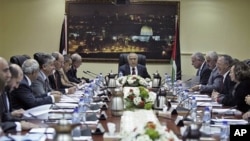The Palestinian Cabinet submitted its resignation Monday to President Mahmoud Abbas, as Palestinian authorities in the West Bank face the same pressure for political reform being felt in other parts of the Arab world.
Bustling Al Manara Square is the political and commercial center for the West Bank city of Ramallah.
The statues of stone lions guarding the center of the square are traditional symbols of bravery, power and pride.
Flags representing the Palestinian Authority and the Fatah party flutter from the lampposts above.
Here young Palestinians like Basam Jabber, 18, gather to drink coffee and discuss the wave of change sweeping the Arab world in the wake of massive protests in Egypt and the resignation of President Hosni Mubarak.
"Yes for sure, this will bring more democracy and more freedom and you know the freedom of speech was not really accepted, but right now everybody can say it and everything can change," said Jabber.
Before President Mubarak stepped down, Palestinian officials were mostly silent about the demonstrations in Cairo and across Egypt.
For Palestinians, Mr. Mubarak had been a crucial ally, both during peace negotiations with Israel and as a mediator between rival factions such as Fatah in the West Bank and the Islamist militant group Hamas in the Gaza Strip.
However, in the days following President Mubarak’s ouster, officials with the Palestinian Authority are embracing the new order.
"We have a positive attitude towards these changes because changes towards democratization can only be good for the Egyptians and the rest of the Arab people, including the Palestinians,"said Ghassan Khatib, the spokesman for the government in Ramallah. So we expect these changes will have only a positive impact on the Palestinian-Israeli conflict and the Palestinian cause”"
On Monday the Palestinian Cabinet submitted its resignation and President Mahmoud Abbas asked Prime Minister Salam Fayyad to form a new government.
A day after Mr. Mubarak’s resignation, the Palestinians announced they will hold long overdue presidential and legislative elections by September.
Hamas has rejected holding such elections in Gaza, but Palestinian Authority spokesman Ghassan Khatib says the vote will occur, if only in the West Bank.
"It is not going to be the ideal election, but at the same time the Palestinian people and their right of voting and selecting their leadership should not remain hostage to the will of Hamas," said Khatib.
Palestinians hope to turn the West Bank and Gaza, located on opposite sides of Israel, into an independent state.
Hamas took over Gaza by force in 2007 and efforts to end the split with the Palestinian Authority in the West Bank have failed.
Mustafa Barghouti, who heads an opposition party in the Palestinian parliament, says it is time for reconciliation.
"The call for democracy is very powerful," he said. "The major impact in Palestine, the largest voice you hear today by the people, is a demand to both Fatah and Hamas to end their division and allow Palestinian unity again so that we can have democratic and free elections, so that we can have people’s participation."
Back in Al Manara Square, Abtihal Eroush, 25, says while life under Israeli occupation is difficult, she is encouraged by what she calls the revolution in Egypt.
She expects young people will lead any future reform in the Arab world.
"Actually I was very excited, I was very happy because finally we have a young generation deciding to go out to do everything, she said. "We are Palestinians under occupation, we do not have a lot of things we can do, but with the Arab countries they are suffering they came out and they woke up and they start talking, that is something interesting."
With winds of change blowing over the Middle East, Palestinians in the West Bank hope their lives will change for the better.
What happened in Egypt, they say, represents the entry of the Arab world into modernization and the awakening of a new generation seeking freedom and democracy.
Palestinian Cabinet Resigns Amid Calls for Political Reform in West Bank




